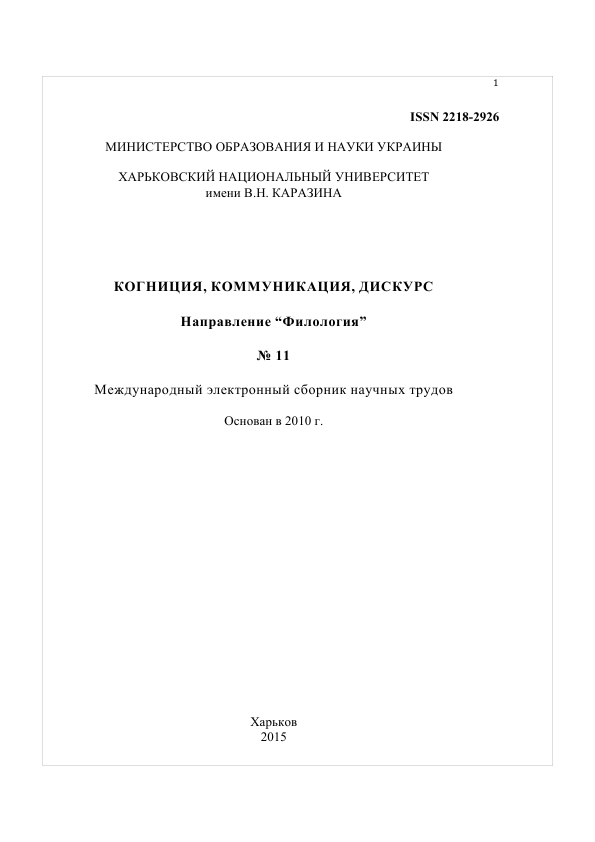Cognitive-conceptual properties of dialogue in their formal-conversational and pragmatic manifestations
Abstract
The article views the dialogue as a compound conceptual space based on the interactants’ cognitive contexts as key sources of Dialogue’s comprehensive intertextuality. Typology of concepts constructing dialogic conceptual space include categorical identity concepts, operative identity concepts, interactive concepts, concepts-ideas, a genre concept, and social-semiotic concepts. Concepts are manifested or marked by formal-conversational and pragmatic means. There seem to be some regular correspondences between concepts’ types and their indexing formal and pragmatic properties of the dialogue.
Downloads
References
Benwell, B., & Stokoe, E. (2006). Discourse and Identity. Edinburgh: Edinburgh
University Press.
Brockmeier, J., Carbaugh. (2001). Narrative and Identity: Studies in Autobiography, self and culture. Amsterdam: John Benjamins Publishing Co.
Brown, P., & Levinson. S.C. (1987). Politeness: Some Universals in language usage:
Politeness phenomena. Cambridge: Cambridge Univ. Press.
Davies, B., & Harrй, R. (1990). Positioning: The Discursive Production of Selves. Journal for the Theory of Social Behavior, 20 (1), 43-63.
Goffman, E. (1981). Response cries. Forms of Talk. Oxford: Basil Blackwell, 78-122.
Grice, H. P. (1975). Logic and conversation. Syntax and semantics, 3, 41-58.
Halliday, M.A.K. (1978). Language as Social Semiotic: The Social Interpretation of Language and Meaning. London: Edward Arnold.
Hausendorf, H. (2002). Social identity work in storytelling: Methodological remarks. Narrative Inquiry, 12 (1), 173–179.
Jefferson, G. (1972). Side sequences. Studies in social interaction, 294-338. Kravchenko, N.K. (2015). Integrativnyj metod I operativnyje metodiki dyscurs-analysa [Integrative method and operative technics of discourse-analysis]. Saabrukken: Palmarium LAMBERT Academic Publishing.
Kravchenko, N.K. (2012). Practicheskaja discursologyja: shkoly, metody, matodyky sovremennogo dyscurs-analysa [Practical discoursology: schools, methods and technics of modern discourse-analysis]. Luck: Volyn’polygraph.
Kravchenko, N. (2015a). Formal conversational and pragmatic properties of dialogue: to the question of correspondences. Problemy zistavnoji semantyky, 135-141.
Linehan, C., McCarthy, J. (2000). Positioning in practice: Understanding participation in the social world. The Journal for the Theory of Social Behaviour, 30 (4), 435-453.
McLean, K.C., Pasupathi, M., Pals, J.L. (2007). Selves creating stories creating selves: A process model of self-development. Personality and Social Psychology Review, 11, 262-278.
Potter, J., & Wetherell, M. (1987). Discourse and social psychology: Beyond attitudes and behavior. London: Sage.
Sacks, H. (1992). Lectures on Conversation. Oxford: Wiley-Blackwell.
Schegloff, E.A. (1996). Issues of Relevance for Discourse Analysis: Contingency in Action, Interaction and Co-Participant Context. Computational and Conversational Discourse: Burning Issues – An Interdisciplinary Account, 3-38.
Schegloff, E.A. (1999). Discourse, Pragmatics, Conversation, Analysis. Discourse Studies, 1(4), 405-435.
Schegloff, E.A. (2000). Overlapping Talk and the Organization of Turn-Taking for Conversation Language in Society, 29 (1), 63.
Searle, J. R., & Vanderveken, D. (1985) Foundations of Illocutionary Logic. Cambridge: Cambridge University Press.
Searle, John R. (1975). Indirect speech acts. Syntax and Semantics, 3: Speech Acts, 59-82.
Swan, D., & Linehan, C. (2001). Positioning as a means of understanding the narrative construction of self: A story of lesbian escorting. Narrative Inquiry, 10 (2), 403-427.
Van Dijk, T.A. (2008). Discourse and Context. A Sociocognitive Approach. New York: Cambridge University Press.
Van Dijk, T.A. (1997). The Study of Discourse. Discourse as Structure and Process. Discourse Studies: A Multidisciplinary Introduction, 1, 1-34.
Van Dijk, T.A. (2003). Ideology and discourse. A multidisciplinary introduction. Barcelona: Ariel.
Wetherell, M. (1998). Positioning and interpretative repertoires: Conversation analysis and post-structuralism in dialogue. Discourse and Society, 9, 387-412.
Zurcher, L.A. (1983). Social Roles: Conformity, Conflict and Creativity. London: Sage, Beverly Hills, CA.
Saul Bellow. (1970). Herzog. New York: Fowcett Crest Book.
Authors, who publish with this journal, accept the following conditions:
The authors reserve the copyright of their work and transfer to the journal the right of the first publication of this work under the terms of the Creative Commons Attribution License (CC BY), which allows other persons to freely distribute a published work with mandatory reference to the authors of the original work and the first publication of the work in this journal.
Authors have the right to enter into separate additional agreements for the non-exclusive dissemination of the work in the form in which it was published by this journal (for example, to post the work in the electronic institutions' repository or to publish as part of a monograph), provided that the link to the first publication of the work in this journal is given.
The journal policy allows and encourages the authors to place the manuscripts on the Internet (for example, in the institutions' repositories or on personal websites), both before the presentation of this manuscript to the editorial board and during review procedure, as it contributes to the creation of productive scientific discussion and positively affects the efficiency and dynamics of citing the published work (see The Effect of Open Access).




